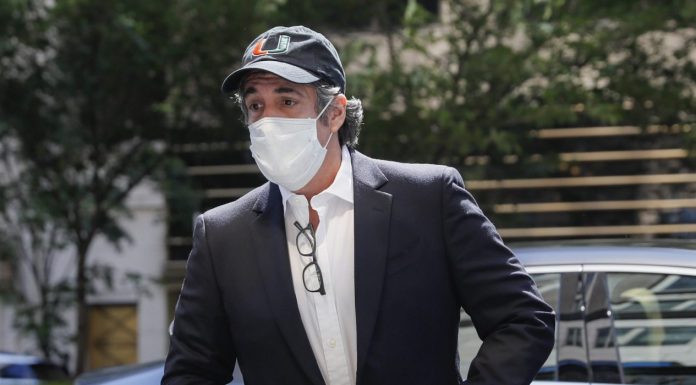A judge ordered the release from prison of President Donald Trump’s former personal lawyer on Thursday, saying he believes the government retaliated against him for planning to release a book about Trump before November’s election.
Michael Cohen was released for home confinement due to the coronavirus but was later spotted enjoying a meal at a fancy restaurant.
Shortly thereafter, prison officials said he violated the terms of the release and sent him back to complete his three-year sentence.
But U.S. District Judge Alvin K. Hellerstein claimed Cohen’s First Amendment rights were violated when he was ordered back to prison on July 9.
The reason behind it was that Cohen refused to sign a form banning him from publishing the book or communicating publicly in other manners, the Bill Clinton-appointed judge said during a telephone conference.
“How can I take any other inference than that it’s retaliatory?” Hellerstein asked prosecutors.
He ordered Cohen to be released from prison by 2 p.m. on Friday.
Hellerstein has courted controversy in the past while presiding over the Southern District of New York.
He has made controversial rulings regarding the recovery of victims at the World Trade Center following the 9/11 attacks, forced the release of videos showing Iraq prisoners detained at the Abu Ghraib prison, and dismissed 17 of the charges against left-wing Hollywood mogul Harvey Weinstein.
Prosecutors insisted in court papers and again Thursday that Probation Department officers did not know about the book Cohen planned to write when they wrote a provision of home confinement that severely restricted his public communications.
“I’ve never seen such a clause in 21 years of being a judge and sentencing people and looking at terms of supervised release,” the judge said. “Why would the Bureau of Prisons ask for something like this … unless there was a retaliatory purpose?”
In ruling, Hellerstein said he made the “finding that the purpose of transferring Mr. Cohen from furlough and home confinement to jail is retaliatory.” He added: “And it’s retaliatory for his desire to exercise his First Amendment rights to publish the book.”
Cohen, 53, sued federal prison officials and Attorney General William Barr on Monday, saying he was ordered back to prison because he was writing a book to be released before the November presidential election.
He has been in isolation at an Otisville, New York, prison camp, quarantined while prison authorities ensure he does not have the coronavirus.
His attorney, Danya Perry, said in a statement that the order was “a victory for the First Amendment” and showed that the government cannot block a book critical of the president as a condition of release to home confinement.
“This principle transcends politics and we are gratified that the rule of law prevails,” she said.
The book will address “Trump’s personality and proclivities, his private and professional affairs, and his personal and business ethics,” according to the lawsuit.
It further stated that the government’s demand that Cohen agree not to speak to or through any media, including by publishing a book, violated his constitutional rights.
When he was furloughed in May along with other prisoners, Cohen was one year into a three-year prison sentence after pleading guilty to campaign finance charges and lying to Congress, among other crimes.
Campaign finance charges related to his efforts to arrange payouts during the 2016 presidential race to keep the porn actress Stormy Daniels and model Karen McDougal from making public claims of extramarital affairs with Trump.
Trump has denied the affairs.

